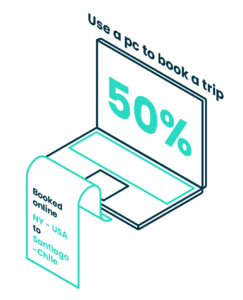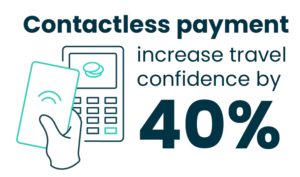4 Key Travel Industry Digital Transformation Trends That you Should Know

The travel and tourism industry keeps moving forward rapidly thanks to new technologies. Digital technologies have created new opportunities for travel agencies and facilitated the digitalization of business processes based on traditional methodologies.
If you want to stay competitive in the dynamic travel market, you need to know what the competition is doing and find the best way to cushion the blow of digital disruption. Deciding which digital trend to pursue can be challenging, though.
That’s why we bring you the most important digital transformation trends you should know in 2022. Before we jump to trends, let’s see what exactly digital transformation is and some interesting stats.
What is digital transformation in tourism?
Digital transformation refers to replacing obsolete and traditional business tools with emerging digital technologies.
In the tourism sector, digital transformation is not a brand new thing. Businesses in the hospitality industry were among the first to implement various digital tools to facilitate digital transformation at scale.
For instance, we take flight and hotel online bookings for granted. That was a digital transformation trend that changed the travel experience forever.
In the past, the only way to book flights and hotels was by phone or in person. However, once information and communications technology (ICT) became readily available, online booking transformed the travel sector as we know it.
However, it didn’t end with ICT. Over the next two decades, tech companies regularly developed and released new technologies. Travel organizations continued to implement them, which led to a sort of digitization revolution.
The situation remains the same to this very day. Let’s see how technology continues to change the travel industry.
How is technology changing the travel industry?
The primary role of digital transformation in tourism is to enhance the travel experience, making it not only high-quality but also seamless and frictionless.
Emerging digital transformation trends revolve around these principles. At the same time, they enable organizations to become more competitive and capture significant profits.
Technologies at the core of the critical travel industry digital transformation trends include artificial intelligence, the Internet of Things, augmented and virtual reality, location-based services, and blockchain. So, how are these technologies changing the sector?
Well, cutting-edge tech, such as AI, powers the best practices in booking and reservations. AI has transformed the customer experience from the ground up. Travelers can now interact with chatbots to find more about their destinations and book directly through a chatbot without having to open new browser tabs or fill out lengthy forms.
Smartphone apps are taking the lead in the travel industry, creating more conveniences for travelers. Since everyone has a smartphone these days, offering dedicated mobile apps was the next logical move. For instance, travelers can now use apps to book their plane reservations and choose the seats they want.
Augmented and virtual reality are bringing a new era of digital tourism. A virtual tour has become a valuable feature, allowing travelers to explore destinations before booking. This digital experience has proved essential in generating more leads and increasing conversion rates.
Social media platforms are also changing the sector. Thanks to their popularity and affordable marketing options, even a small travel agency can offer excellent customer care options by adding an AI-powered chatbot to answer consumers’ questions.
Finally, we have big data as something that has a vast capacity to transform how travel organizations do business. Thanks to big data, machine learning, and analytics, travel organizations can now make sense of massive data sets, discover trends and patterns, improve forecasting, and adopt data-driven business decision-making processes.
Travel industry digital transformation stats
All those online booking opportunities create this huge online travel market. This digital market comprises numerous companies, including online travel agencies. They allow tourists to become completely independent when making travel decisions and booking destinations. As a result, the global online travel market has reached $433.2 billion in 2022.
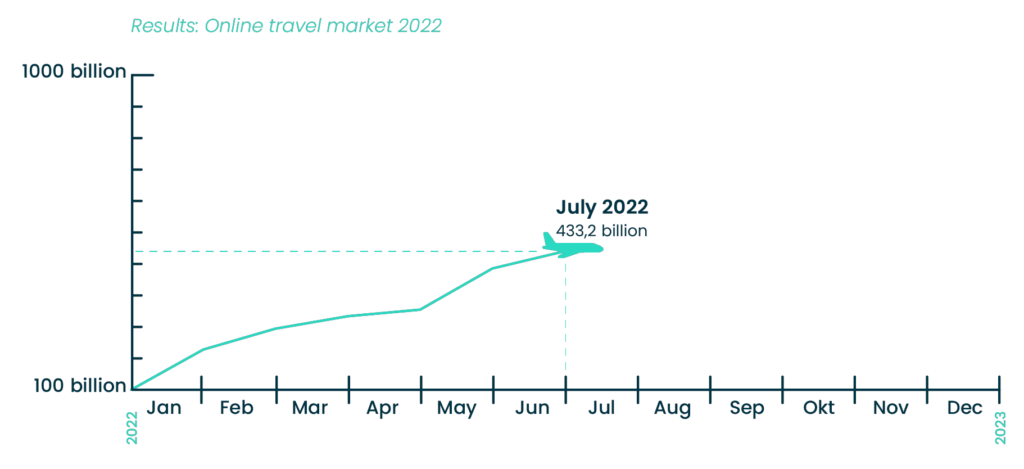
Travelers worldwide can book holidays through various channels. They can do it over a mobile phone or computer, call a travel agency, or meet face to face with a travel agent.
What do you think is the most popular channel for travelers? If you said computer, you were right. Over 50% of travelers across all demographics use a desktop PC to plan and book their trips.
As more and more organizations in the travel sector start using dedicated mobile apps, it’s logical to expect an increase in the global revenue of mobile apps in the travel segment. In 2021, this revenue amounted to $296 million. That’s an almost 40% increase compared to the 2020 revenue.
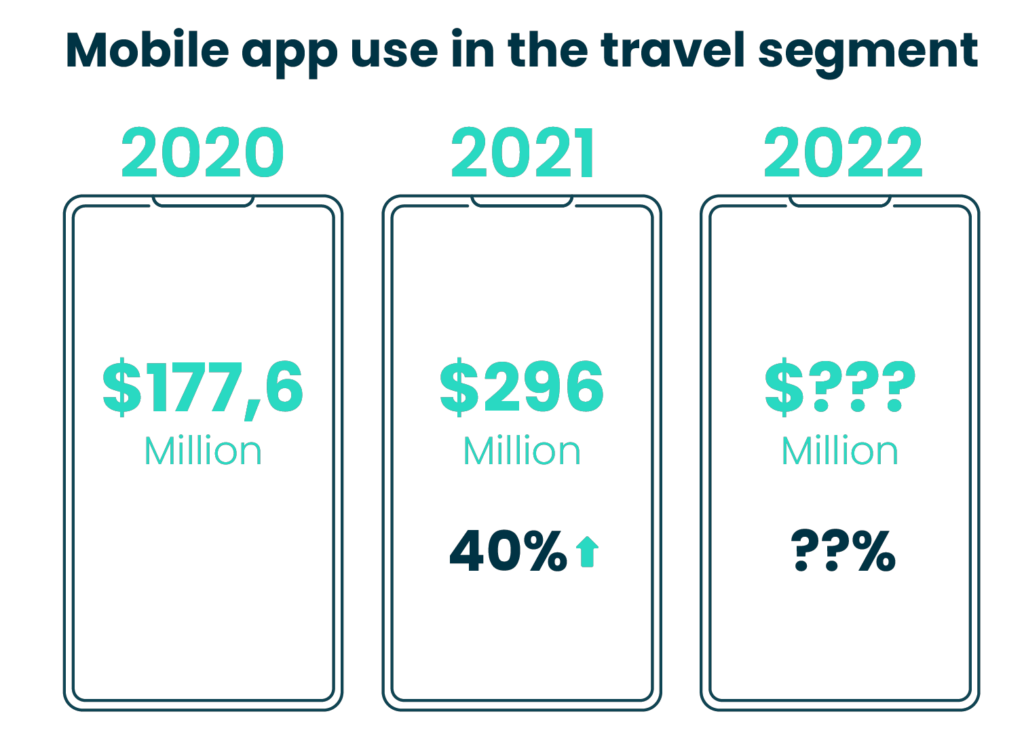
Contactless mobile payments contribute to the next digital transformation trend. It appears that more and more travelers prefer this type of payment.
A recent study examined the effects of various technologies on travel confidence. For 40% of travelers, contactless mobile payments are a tech that can increase travel confidence the most.
Digital marketing is also transforming the travel sector. Out of all marketing channels, paid ads on social media and search engines appear to be the two most attractive ad platforms for travel companies.
In 2019, travel companies in the US spent over $6 billion on digital advertising. That amount has decreased due to the outbreak of coronavirus. Currently, it’s still recovering, and it’s projected to amount to $4.5 billion by 2023.
IoT plays a significant role in personalized customer experience and travel service. Travelers and travel companies benefit directly from it. Travelers can control services and appliances through one app, while travel companies can accumulate more data to deliver even more personalized offers and experiences.
Over 80% of consumers already prefer services that reflect their unique needs and preferences.
Most relevant travel industry digital transformation trends
Now that you know what digital transformation is in the travel industry and the interesting facts, it’s time to move on. Here are the sector’s emerging digital transformation trends, including the crucial benefits and real-life use cases.
Big data for unlocking new revenue opportunities
Big data refers to compiling big data sets to streamline business decision-making processes, price optimization, getting insights, and personalizing offers. One of the recent noteworthy trends is using big data to unlock new revenue opportunities.
Benefits
As you already probably know, digital markets are volatile, reflecting booking prices. Big data can help organizations identify the most attractive booking opportunities online profit margin-wise and add them to their listings.
Who can leverage it?
Solutions that leverage big data and AI to unlock hotel booking profits, such as Hotelmize, are suitable for travel companies of all sizes, including bed banks, hotel distributors, travel agents, and wholesalers.
Gone are the days when big data and AI were available only to corporations. Today, even small travel agencies can leverage them to capitalize on hidden revenue opportunities in the market.
Real-life use case
While Hotelmize doesn’t disclose its client list, its solution leverages big data and sophisticated algorithms to increase hotel booking revenue by more than 40%. The company has won multiple awards, including the prestigious Phocuswright Innovation Summit People’s Choice Award.
Virtual reality for driving engagement and sales
Virtual reality is a simulation using computer-generated images or photography to create realistic 3D experiences. Thanks to the latest 3D software, designers can create mesmerizing 3D visualizations of any space.
VR has tremendous value for travel companies because it enhances the most crucial stage of a customer journey – exploration and research.
Benefits
Virtual reality offers many benefits to travel companies. It is the only way to provide truly immersive and interactive experiences. It’s simply something videos and images can’t deliver.
It enables travelers to explore destinations before booking, leading to increased leads, engagement, and ultimately more revenue.
Who can leverage it?
There are no limits to who can leverage virtual reality. If you offer any travel experience, you can use virtual reality to enable travelers to experience some of it from the convenience of their homes.
Real-life use case
The real-life use case we have for virtual reality is the one of Celebrity Cruise. The cruise company hired a virtual reality specialist to create 360-degree images of cities and specific locations in their offer.
However, they also decided to spice it up by adding specific codes to images. They sent travelers on a sort of virtual reality scavenging hunt. Those who found the hidden codes were bound to win attractive prizes.
The outcome was fantastic. The engagement rates on social media accounts went up by more than 100%, and social media following increased by a couple of 100% more.
IoT to cut down operation costs while enhancing the stay experience
IoT refers to many sensors connected through a central hub. IoT excels in collecting data and executing processes when certain conditions are met.
It can help hotels deliver an intelligent home experience to their guests. They can also improve their internal operations and reduce expenses thanks to fine-tuning and other optimizations.
Benefits
There are many benefits IoT unlocks for the travel and hospitality sector. It can enable you to provide more control to your guests and allow them to personalize the travel or stay experience on their own. With smart IoT sensors and automation, hotels can save thousands of dollars on energy and water bills.
Who can leverage it?
IoT has hundreds of use cases, rendering it a digital transformation trend that can benefit everyone in the travel and hospitality sector. It includes hotels, airlines, and resorts.
While installing and setting up IoT infrastructure may have considerate upfront costs, the maintenance is more than affordable.
Real-life use case
The real-life use case of IoT brings us to The William Vale Hotel. The managers of the hotel decided to equip all of its 183 guest rooms with blinds, locks, HVAC, and thermostat sensors.
The outcomes of the strategy were excellent. All the guests reported high satisfaction rates with their stay at the hotel, and the hotel managed to save about 40% on energy bills.
Dedicated mobile app for airlines
A dedicated mobile app is a piece of software developed from the ground up for iOS and Android users. It’s an app that connects to the central company’s database but operates separately from the official website.
As we’ve mentioned earlier, one of the trends among airlines is using mobile apps to streamline the booking process for passengers.
Benefits
A dedicated mobile app offers many benefits to aviation companies specializing in destination travel. It can help a company reach more potential travelers by making the booking process even more convenient and streamlining the research phase for travelers, thus potentially boosting lead generation.
Who can leverage it?
A mobile app with booking capabilities is not available only to airliners of all sizes. Other companies specializing in transporting travelers can use a mobile app to facilitate the booking process and keep travelers well-informed.
Real-life use case
While publishing a dedicated mobile app can increase bookings by a certain margin, keeping it up to date and relevant to the latest UX practices is just as crucial for achieving your goals.
That’s why we’ve decided to highlight the Hummingbird Airlines case study. After the UX update, the number of users that installed and used the airline app increased by a whopping 64%.
Conclusion
The digital revolution is at its peak, and navigating this diverse ecosystem of digital technologies can be challenging for someone inexperienced. The travel industry’s digital transformation trends tell us how impactful technology can be.
As you can see, each of the trends delivers unique benefits and outcomes.
Since your business is unique, you should not pursue a trend and adopt a technology solution before defining your goals. Once you have clear goals, you can assess digital solutions and choose the one that can benefit you most.
Subscribe to
our newsletter
Yay! You are now
subscribed to our
newsletter
Mize is the leading hotel booking optimization solution in the world. With over 170 partners using our fintech products, Mize creates new extra profit for the hotel booking industry using its fully automated proprietary technology and has generated hundreds of millions of dollars in revenue across its suite of products for its partners. Mize was founded in 2016 with its headquarters in Tel Aviv and offices worldwide.
Related Posts
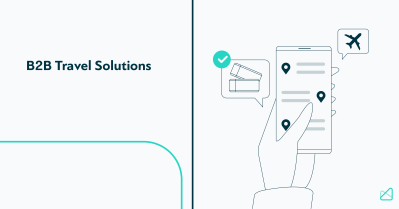
Your Ultimate Guide to B2B Travel Solutions
17 min. You’ve probably noticed that B2B travel solutions play a vital role in the global B2B travel sector. We are talking about the market bound to reach the size of $4952.96 by 2028. That’s a CAGR Growth of 17.51%. No wonder leading B2B travel solutions process over 80.000 bookings and 14.000 searches a day. […]
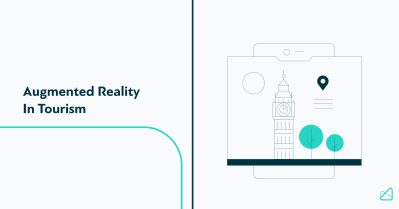
5 Ways Augmented Reality is Enhancing the Tourism Experience
20 min. Augmented reality (AR) can truly transform the way people discover and explore new places. By combining physical exploration with digital elements, travelers are able to gain deeper insights into different cultures while making memories along the way. In today’s world, more and more travelers are turning to technology to add excitement and convenience […]

Everything You Need to Know About Virtual Tourism Companies
24 min. Virtual tourism refers to a specific tourism niche using technology that enables travelers to experience activities, locations, and destinations without leaving their homes. The types of virtual tours depend on the multimedia format offered to travelers. It can be anything ranging from still images, video, and audio to interactive virtual reality. The popularity […]
